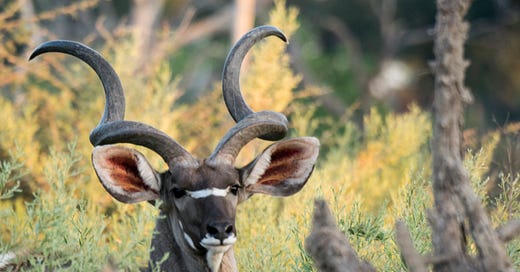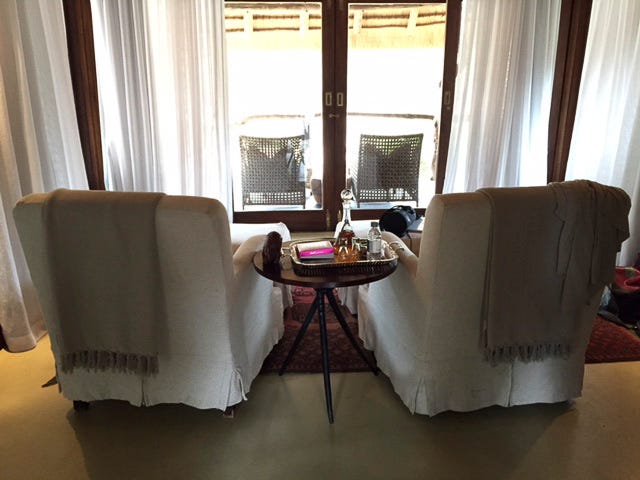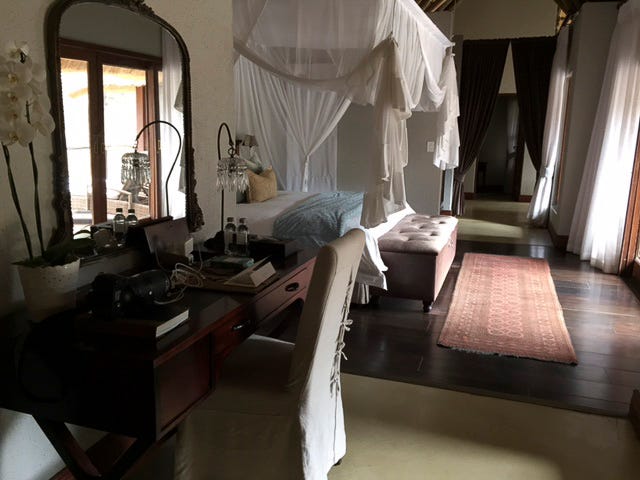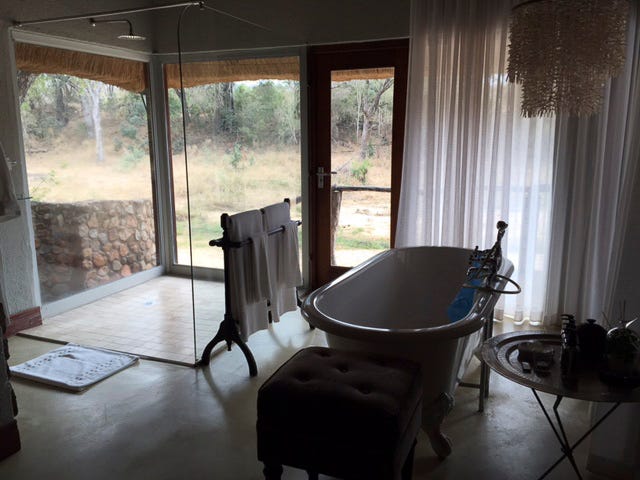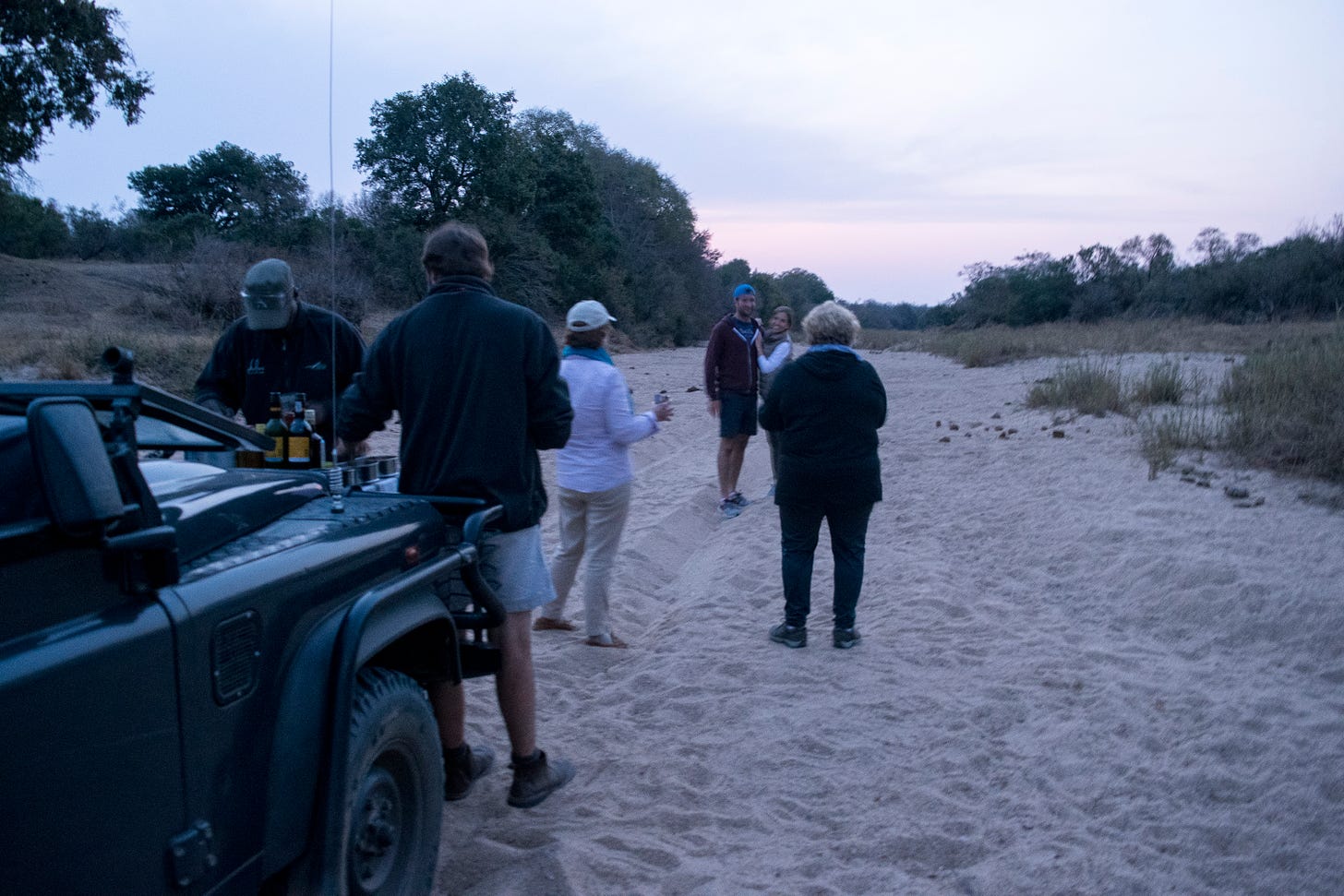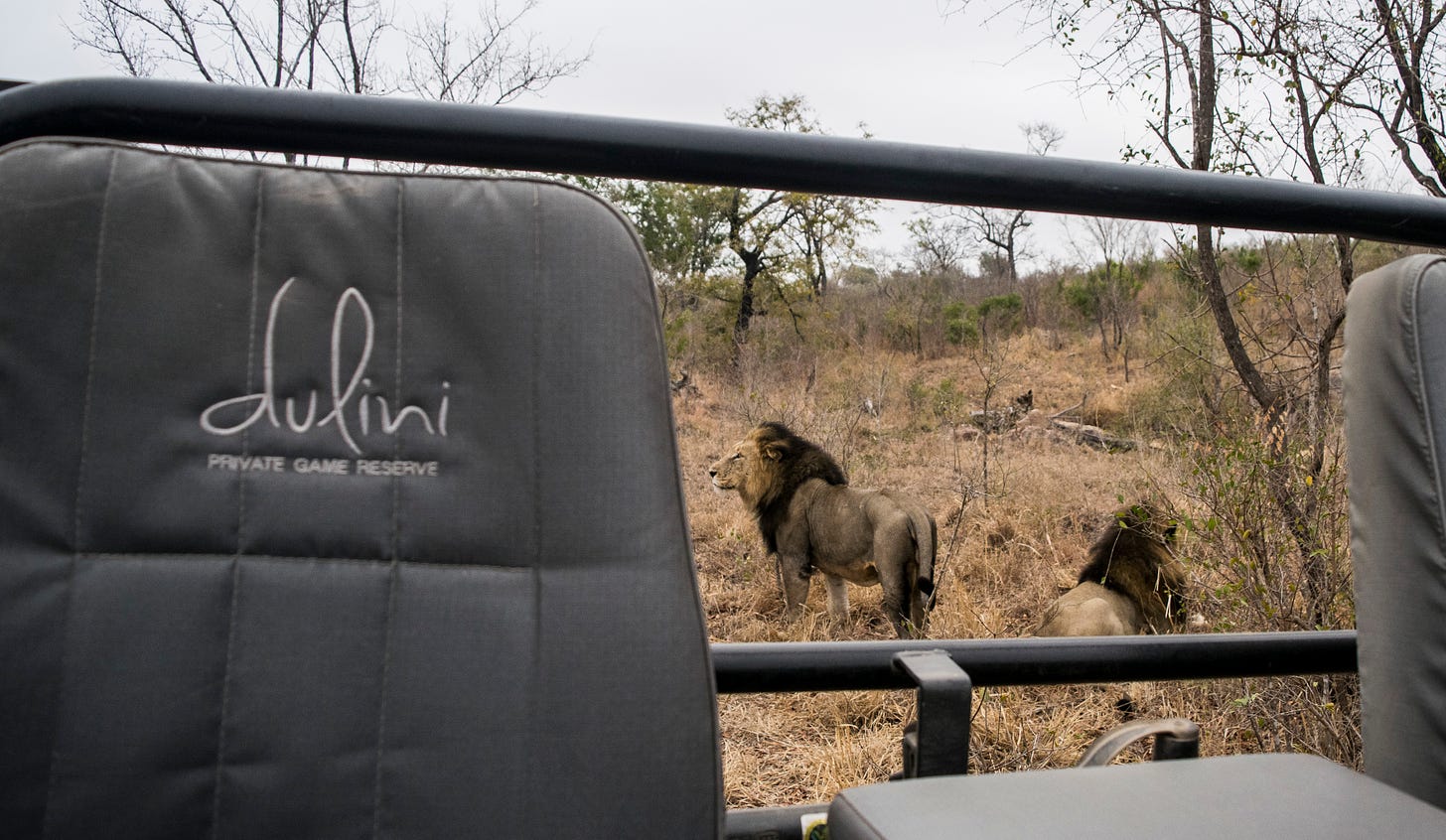I’ve only ever stayed in one lodge in South Africa, both times I visited: Dulini Lodge. It is, hands down, the absolute most glamorous place I’ve ever stayed, a real honeymoon spot. Each guest (or couple, or, as in the case of my second visit, mother/daughter pair) gets their own little hut, which isn’t terribly unusual for safaris, it’s kind of how things are done, but depending on the lodge in which you’re staying, your individual accommodation could range anywhere from a simple tent to a colonial fantasy (complete with animal skins) to, as these were, suites that might be considered over-the-top in a five-star hotel.
There was a chandelier. There was a sitting area with overstuffed armchairs, looking out over a grassy area where a kudu — a large antelope with corkscrews for antlers — might stroll through. There was a shower and also a freestanding tub, and on one occasion (when I was with my husband, tactfully not when I was with my mom), we returned to find the bath filled with a bubble bath and — yes — rose petals.
The kudu.
All of this was preposterous, of course. There is absolutely no reason why you need a chandelier out in the bush. In the safari forum that I used to frequent and probably should still frequent today — SafariTalk.net — these kinds of luxuries stir up heated debates. The people on SafariTalk are extremely serious about safaris — many have been on dozens of safaris over many years, several have moved to Africa or changed the entire structure of their lives in order to accommodate their safari habits. Some people only self-drive, or camp on their own, for safaris. One regular who goes to lodges won’t have a drink during “sundowners” — the happy hour commonly taken out in the bush at the end of a safari day — for fear it’ll make him less sharp at spotting wildlife on the drive back to the camp. Others figure, they’re on vacation. Why not enjoy a spot of luxury while you also enjoy the wildlife?
A terrible picture of an actual honeymoon couple getting their picture taken during sundowners — you can kind of see the bottles of liquor on the hood of the car.
What I noticed was that, along with arguably silly perks like heated towels, you *also* got something I did care about: fewer people in the vehicles. The fancier the lodge, the more likely they were to take out the middle seat in the jeep, making a nine-seater open-air jeep into a six-seater. Sometimes, too, they’d send out the jeep with just four people or even, if some guests had left and the new ones hadn’t arrived yet, you might get a game drive all to yourself.
The advantage to having the center seat removed: seeing out the back.
In particular, I was noticing that people were having these experiences at a place called Dulini.
When I research travel, I start innocently enough. Maybe I start up a few flight alerts with Google Flights. Maybe I have some tabs open with TripAdvisor reviews. Soon, though, I’m up at 2 am, downloading data from the Airline Data Program or using KVS to try to figure out which routes have seats available for airline points or upgrades.
By the time I reach this level of insanity, I’m probably on a first-name basis with several of the folks at the TripAdvisor Forum for South Africa — and, as an aside, TripAdvisor Forums are a wonderful way to ask questions of locals for any place you might want to visit. As I watched people pepper the forum with questions, leave, and then return, I noticed that the people who were booking at Dulini seemed to return with extraordinary stories. At the time, Dulini was a small lodge, and not particularly well-known, but the people who went there couldn’t say enough about the place, the wildlife, and the guiding.
We were booked elsewhere, but I changed our reservation — and just in time. All the good reviews were starting to make a difference. Dulini’s TripAdvisor rating was going up. I kept checking their prices, and they kept raising them. By the time we arrived, what was an expensive four-day holiday had turned into something completely out of our reach.
Fortunately, Dulini offers generous discounts to people who have stayed with them before, which enabled me to return with my Mom nine months later, for the one-year anniversary of my Dad’s death. By the time I returned, the once-small lodge was contemplating buying another lodge, Leadwood, which I see they’ve now done. They’ve even added another new lodge on top of that one, Dulini River, and upped the ante at the original lodge: there’s a spa now, and an exercise room, and a wine cellar.
No doubt I sound like a fan, mad because her favorite band has been “discovered” and is “selling out.” It’s silly, I’m sure. And probably it’s in part because, due to all these modifications, the price of a stay at Dulini is now far beyond my means, no matter what discount they offer. I’ll never go back. And frankly — and I know this sounds like sour grapes but bear with me — I probably wouldn’t want to. Because once you froo-froo a lodge up too much, once you make it too distant from the wildlife that, theoretically, it is there to witness and marvel at, once it becomes a Club Med without the beach — then the kinds of people who are going to come to that lodge are not going to be wildlife people any more. The guides aren’t going to be wildlife guides. It’s surprising but true that a safari is not a restful vacation, and you need a certain kind of person who is going to enjoy that. Joyful, yes. Exuberant, yes. Restful, no.
You’re getting up before dawn every day. You’re getting tossed around the back of a Jeep that’s mostly driving along unpaved tracks but sometimes absolutely bushwhacking through the undergrowth following wild dogs. There’s cold and heat and occasional rain (though I wish there were more rain given South Africa’s series of droughts these past few years).
All of which is why, at a certain point a few days in, my Mom and I said “enough” to lunch. We couldn’t take it any more, couldn’t sit up for one more meal — we’d rather nap than eat.
The staff, surprised, gave us some fruit and cheese and crackers and such and we thanked them, brought it back to our room, put it on the chest of drawers, and promptly fell onto our beds and sound asleep.
Which is how we came to discover that, as we had napped, some small animal — a rodent of some kind clearly — had nibbled on our snacks.
The Dulini staff were aghast. It was probably a little squirrel-like creature, they said, that liked to live in the thatched roof of the hut.
“No problem at all,” I said, “we have rodents in the U.S. too.” I had just been living in a Washington, D.C. row house where we kept telling the landlord we had rats, and he kept saying, “you mean mice,” and sending the exterminator out with mousetraps.
Except we didn’t mean mice. We meant rats.
Finally, the dog of the house, an old black lab who belonged to one of my housemates, cornered a rat just right, got it between its teeth, and snapped it against the wall, breaking its neck. We got the exterminator out the next day. “Oh,” he said. “You mean rats.”
I have no idea if there are cute, squirrel-like creatures that live in the thatched roofs of South Africa, or if the nibble marks were from, say, a common mouse or even a rat, but there’s something wonderful about how universal rodents are. Everyone has had a rodent in their life at some point; Dulini could add a hundred wine cellars and fill them all with the best wine in the world, and I could live in the loveliest homes in D.C., or the dowdiest shacks, and we would both still have rodents in our lives.
Other wonderful things about rodents: How closely they stick to us without ever becoming domesticated. Indeed, it almost seems that they have domesticated us instead — they use us for their own needs, and then go on about their business. Rodents are like some inverse, dark-universe version of pets, and I think that makes them intriguing.
I’ve been reading more about rats, and I’ll write more about them at a later date, but I just wanted to share these little stories with you first. Feel free to share your own thoughts and feelings below, and I hope you have a wander-ful week.

